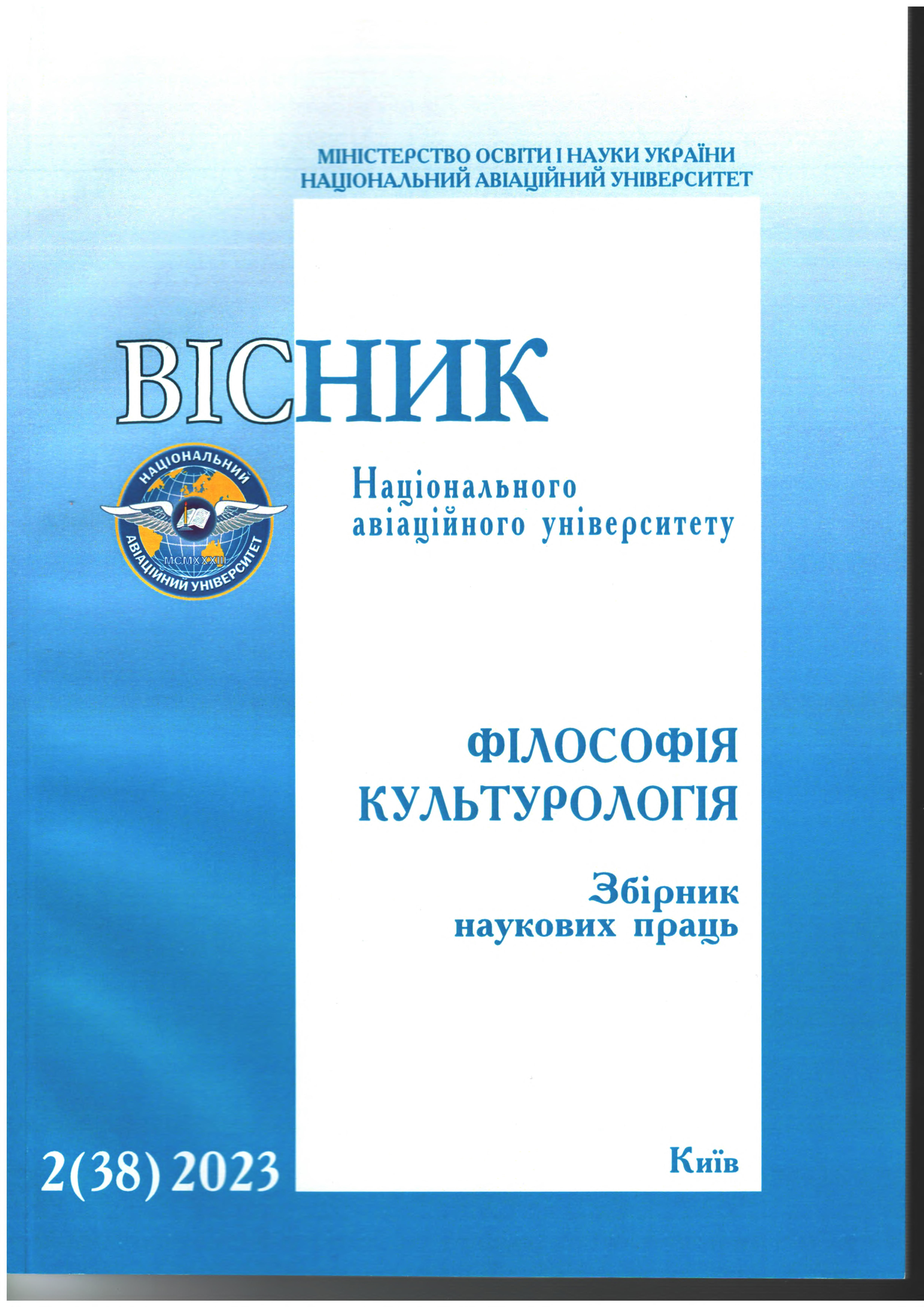GLOBAL AND GLOCAL IN MODERN COMMUNICATION AS A FACTOR OF SOCIOCULTURAL TRANSFORMATIONS
DOI:
https://doi.org/10.18372/2412-2157.2.18117Keywords:
globalization, glocalization, scientific communication space, sociocultural transformationsAbstract
Introduction. Globalization discourse testifies to a double impact on human existence at the individual and societal levels, transforming the multicultural space, and homogenizing it. Understanding the relationship between global and glocal processes in scientific discourse is present mainly in sociology, politics, and economics. The abovementioned actualizes the need to study the glocal and the global in the activity-communication paradigm, reproducing the substantial foundations of human existence. The aim is the cultural-philosophical understanding of the phenomenon of linguistic discourse of globalization and glocalization in the scientific communication space of postmodernity. Research methods. A sociocultural methodological approach and a complex of methods of scientific knowledge: systems analysis, comparison, and critical analysis were used to achieve the defined goal. A systems approach was used to examine the theoretical, methodological, and source base of the study. Research results. The study of communication processes acquires special relevance in the era of the information society when the communication essence of social realities and the role of communication in the globalized world are being reviewed. A key feature of globalization is the ability of regional production structures to capitalize on the localized effects of agglomeration, stimulating the emergence and long-term consolidation of specific conditions, assets, and opportunities, based on which transnational capital is formed. One of the reasons for the popularity of the theory of glocalization is its sharp contrast with the theory of modernization, which predicted the inevitability of all civilizations following the stages of progress through which Western civilization had passed. The idea of glocalization denies the idea that the whole world will inevitably follow the path of liberalization, the development of capitalist relations, will be more oriented towards consumption, etc. Discussion. Conceptual approaches make it possible to capture the main views on interaction in the space of the global-local binary. It is still quite early to talk about the completion of the ontological and theoretical understanding of glocalization. Researchers have not reached a final agreement on the demarcation of the ontological fields of terms in the chain of "global" - "glocal" - "local". However, the biggest problem lies in the ambiguous interpretation of the very concept of global. Conclusions. The analysis conducted on scientific discourse reveals an ambiguity in the terminological-conceptual vocabulary. While some scientists view globalization and localization as interconnected and mutually reinforcing processes, others see them as two opposing phenomena with significant contradictions between them.
References
Beck U. What Is Globalization? London: Polity, 2000.
Booth S. Crisis Management Strategy: Competition and Change in Modern Enterprises (1st ed.). Routledge, 1993. https://doi.org/10.4324/9781315645674
Castells M. The Information Age: Economy, Society and Culture. Oxford: Basil Blackwell, 1996. Vol 3
Chew M. M. Delineating the emergent global cultural dynamic of ‘lobalization’: The case of pass-off menswear in China. Continuum.
No. 24(4). P. 559-571. DOI: 10.1080/10304310903222599
Fink S. Crisis Management: Planning for the Inevitable.New York: AMACOM, 1986.
Franсois С., ed. International Encyclopedia of Systems and Cybernetics. Munchen: K. G. Saur, 1997
Blatter J. Glocalization. Encyclopedia Britannica. URL: https://www.britannica.com/topic/glocalization (Last accessed: 05.08.2018).
Huntington S. P. The clash of civilizations? Foreign Affairs 72(3) 1993. P. 22-49
Khondker H. H. Globalisation to Glocalisation: A Conceptual Exploration. Intellect Discourse, 2005. No. 13(2), р. 187.
Mitroff, Ian I. Managing crises before they happen: What every executive and manager needs to know about crisis management.
AMACOM American Management Association, 2000.
Nederveen Pieterse J. Globalization and Culture: Global Mélange. Rowman & Littlefield, 2015.
Ritzer G. Rethinking Globalization: Glocalization. Grobalization and Something. Nothing. Sociol Theory. 2003. No. 21(3). P. 193-209.
DOI: https://doi.org/10.1111/1467-9558.00185
Robertson R. Globalization: Social Theory and Global Culture. Sage, 1992. Vol 16. DOI: https://doi.org/10.4135/9781446250563
Robertson R. Glocalization: time–space and homogeneity–heterogeneity. Global Modernities / Ed. Robertson R., Featherstone
M., Lash S. London: Sage, 1995. P. 25-54
Robertson R. Situating glocalization: A relatively autobiographical intervention. Global Themes and Local Variations in
Organization and Management: Perspectives on Glocalization. New York: Routledge, 2013. P. 41-52
Rostow W. W. The Stages of Economic Growth: A Non- Communist Manifesto. Cambridge University Press, 1990
Roudometof V. The Glocal and Global Studies. Globalizations. 2015; No 12(5). DOI:10.1080/14747731.2015.1016293. P. 5.
Spiegler, M. (2000) Globalization: Easier Said Than Done. The Industry Standard, October 9, 2000, 136- 155.
Steger M. B. It’s About Globalization, After All: Four Framings of Global Studies. A Response to Jan Nederveen Pieterse’s ‘What is Global Studies?’ Globalizations. 2013. No. 10(6). P. 771-777
Turner B. The enclave society: Towards a sociology of immobility. Eur J Soc Theory. 2007. No. 10(2). P. 287-304. DOI:10.1177/1368431007077807
Абисова М. А. Комунікативний потенціал культурних відмінностей в інформаційному суспільстві. Вісник Національного авіаційного університету. 2018. Вип. 1 (27). С. 9‒43. (Серія «Філософія. Культурологія»).
Батченко Л. В. Діалектика глокалізації, або локалізація як відповідь на виклики глобалізації. Прометей. Донецк, 2004. Вип. 1 (13). С. 25-29.
Гончарова О. В. Понятійно-категорійна сутність та основні засади глокалізації Вісник Київського національного університету імені Тараса Шевченка. 2021. Вип. 22. С. 464-472. (Серія «Міжнародні відносини»).
Дротянко, Л. Г., Абисова, М. А., Пода, Т. А., Орденов, С. С. Філософія діалогу в комунікативних практиках інформаційного суспільства. Талком; Talkom. 2020, 8-27.
Жуков С. А. Глокалізація як сучасний і перспективний процес розвитку світового господарства та міжнародних економічних відносин. Науковий вісник Ужгородського університету Вип. 3. 2014. С. 199-201.
Клешня Г. М. Перспективи подолання глобальних викликів ХХІ сторіччя в постмодерній реальності. Вісник Національного авіаційного університету. Серія : Філософія. Культурологія : зб. Наук. Праць. 2023, 1 (37), 28-35.
Кривицька О. В. Дослідження пограниччя у контексті парадигми простору. Наукові записки Інституту політичних і етнонаціональних досліджень ім. І.Ф. Кураса НАН України. 2017. 2 (88), 367 с.
Лук’яненко Д. Г. Глобальна економіка ХХІ ст.: людський вимір: монографія; Д.Г. Лук’яненко та ін.; за заг. ред. Д.Г. Лук’яненка та А.М. Поручника. К.: КНЕУ, 2008. 420 с.).

